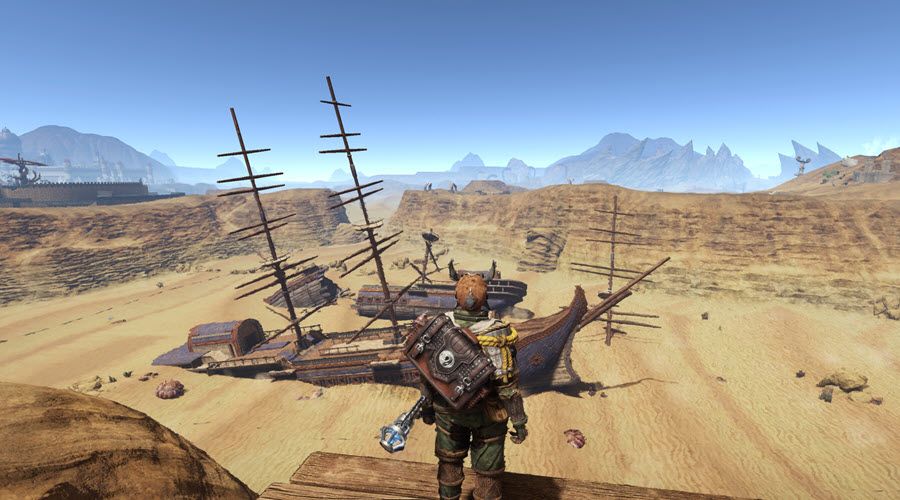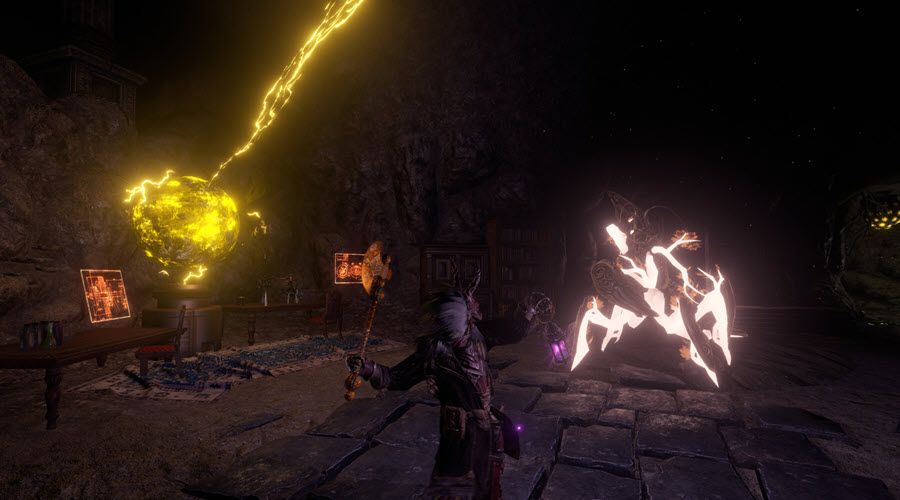Outward Definitive Edition

Review
Originally released in 2019, Outward is an immersive action RPG where you embark on a journey in the vast and dangerous world of Aurai. With its peculiar combat and survival mechanics, Outward can be a cruel experience for those who come unprepared, as it constantly requires taking care of your character’s needs (food, water and sleep). Fortunately, you can play the game with a friend via local and online co-op, which makes it easier to survive and more enjoyable to explore.
Before jumping into the story, it’s vital that you access the tutorial from the main menu. Not only does it explain every aspect of the gameplay, but it also gives proper demonstrations that will better prepare you for what comes next. The main campaign will also include multiple suggestions from different NPCs, but those will only be theoretical, so don’t skip the tutorial. After that you can proceed with a new game, which begins with the character’s customization by choosing the name, gender and aspect and then moving into his or her predefined origins that will be shown in the form of narrated artworks.
After a terrible shipwreck, you wake up in your hometown, Cierzo, with only one of the crew members left alive. You have no time to recover from the tragic experience as you learn you owe a big sum of money to your hometown’s tribe to pay your ancestors’ debt (known as “Blood Price”). This is where the game immediately opens up. Although some NPCs will give suggestions on what you can do to pay your debt, from the first minutes you will be left alone with your own “freedom”. How you pay the debt is up to you; you can ask your previous shipmate for help, complete a few tasks for different NPCs, explore the dangerous world outside the walls looking for treasures or rare artifacts. The game never holds your hand, to the point that you can even refuse to pay your debt (maybe ‘cause you think it’s wrong). Just know that if you don’t pay it, your house will be confiscated and you will be homeless for the rest of the game (at least until you find and buy a new house, which could take a while). As you can see, there is a great set of choices and consequences and not all of them are clear, but the game allows you to build your own adventure.

Completing this quest is only the first step, though. Later on you will be presented with three main factions (four if we include The Soroboreans DLC): the Blue Chamber Collective, the Holy Mission and the Heroic Kingdom of Levant, each one located in a different region and with their own political system. Similar to Gothic, Risen and the like, choosing one faction will lock out the others. This certainly increases the game’s replayability, but it’s not an easy choice to make during your first playthrough. The game only gives you basic info about these factions and you need to reach them if you want to know more. Reaching them requires travelling, travelling requires preparation and preparation requires money. It took me quite some time to complete some basic fetch quests (“go there and bring me this item”), return to Cierzo alive and upgrade my gear so I could survive the journey towards the faction I was interested to join (the Heroic Kingdom of Levant, which is located in the furthest region). After you have proved your loyalty to one faction and joined them, you will be gradually presented with more quests, which will inevitably clash with the other factions’ goals, and more choices for you to make that will shape the fate of Aurai. While Outward is clearly not a story-driven game, I really appreciated the quality of writing regarding the main quests, though several characters’ stories are treated rather superficially. Secondary quests are basically fetch ones introduced with a few lines of dialogue that require you to find an item inside a dungeon or clear some bandits’ outpost. There are also some quests that are time-sensitive, but there is no indication on when they “expire” and will change if you take too long to complete them.
As mentioned earlier, survival is a core gameplay mechanic, as you need to take good care of yourself managing hunger, thirst and sleep, which will either give bonuses or penalties to your attributes. Occasionally, you will also need to check your body’s heat, as some locations feature different climates that can cause you multiple diseases if not prevented with potions and suitable clothes. At the beginning of the game you will start with only a few items and from there you will have to find food, water and gear if you want to survive. Getting some basic weapons, a backpack and a lantern is a must and you will find most of these by simply exploring the area surrounding Cierzo, but the best equipment is only obtainable from vendors. Exploring will also allow you to find other useful items, like a harpoon used to catch fish, or a pickaxe to collect rocks and minerals. But remember that your inventory is limited and when you have too much weight on your shoulders you will simply stop moving.
The world of Outward can be brutal and challenging. Like a real Witcher, winning a battle in Outward mostly depends on your preparation. Laying traps, drinking potions and enchanting your weapon before jumping into combat is a must if you wish to survive. It’s perfectly normal to be defeated by wolves, bandits and generic monsters, yet that is also very frustrating because combat is clunky while weapons feedback and collisions are non-existent. This makes every encounter a serious threat, and while you can simply avoid most of the enemies in the open world, inside dungeons you can only try to lure them one by one, but you will eventually run out of healing potions and resources. When you “die” it isn’t the end though; a random event will be triggered and you will either be saved by a stranger or be brought to the nearest dungeon (like bandits’ camp or monsters’ cave) from where you must escape.
Rather than giving you a skill tree with multiple abilities to unlock, Outward chooses an old-school approach. Like in Gothic, Risen and similar, you buy and learn new abilities from masters found around the world, each one specialized in a different category. This is certainly an interesting take on the RPG aspects, but comes with multiple issues. First thing, it’s not really easy to find money in this world. Completing fetch quests will only grant you a few coins, while monsters won’t drop any. This may result in a very grindy progression system, where you need to spare every single coin in order to afford not only better equipment, but also active and passive abilities. The second issue is that, since there are no experience points, you gain nothing from defeating enemies (aside from their loot). There is no point in defeating them, and you will only do so when you desperately need a certain item, or when you are inside a linear dungeon and can’t avoid fighting.
Graphically the game is kinda a mixed bag. Good lighting, shadows and special effects, but textures look dated, with low details and simple character models. Despite most of the dungeons being boring and linear copy-pastes, the world of Outward is really fascinating and partially reminded me of Dragon’s Dogma’s one. Unfortunately, there isn’t a fast travel option and you will often be forced to travel multiple times across the same regions for quest purposes. Sure, there is a caravan that you can pay to fast travel, but its destination is always randomized. Sometimes it will spare you some walking; other times it will only go in the opposite direction, so it will be useless.
The Definitive Edition also comes with quality of life improvements and two DLCs: The Soroboreans and The Three Brothers, which add new content and integrate new gameplay mechanics within the base game. The Soroboreans add-on includes one more faction with its own storyline and set of quests. Since you can only join one faction, this can seem to be optional during your first playthrough, as you will most likely join the faction you like the most. The Three Brothers DLC seems to be better, introducing a new explorable area, new quests and even a city-building mechanic.
Technically the game runs quite smoothly and I didn’t encounter any issues, but I should note that for some reason my previous save file from Outward (standard edition) didn’t get recognized in the definitive edition. This can make players lose all their progress, forcing them to restart the game from the beginning.
In a world where most action RPGs adopt similar gameplay mechanics and open world structures, Outward really feels refreshing. It mixes quests, exploration and immersive survival mechanics really well, but the combat isn’t enjoyable and the progression is entirely based on how much money you can find, not on how long you have been using certain weapons. It can be a brutal experience for those who are not used to challenging games, and even for those who are it will certainly be an intense journey, better shared with a friend.
Review written by Sonic Punk for Zeepond.com
Outward Definitive Edition Steam Store Page
Positives
+ The Definitive Edition includes QoL improvements and two DLCs+ Interesting world-building and factions
+ Immersive survival mechanics
+ Local and online co-op functions
+ Good replayability
Negatives
- Clunky combat and non-existent collisions- Steep learning curve
- Grindy and unbalanced progression based on money
- Many dungeons look nearly the same
Review Summary
With its dangerous world and immersive survival mechanics, Outward Definitive Edition can be as wonderful as it is brutal. It is certainly more fun with a friend.
Share this review!
Zeepond Rating: 7/10










Video
Game Categories
All Game Reviews (1353)Hardware Reviews (0)
Action (341)
Adventure (151)
Alpha Games (2)
Anime (5)
Board Games (3)
Casual (135)
First Person (19)
First Person Shooter (30)
Hardware (0)
Horror (38)
Massive Multiplayer Online (4)
Pixel Graphics (22)
Platformer (94)
Puzzles (65)
Racing (26)
Role Playing Game (61)
Simulation (53)
Sports (20)
Strategy (246)
Third Person (11)
Utility software (1)
Virtual Reality (22)

